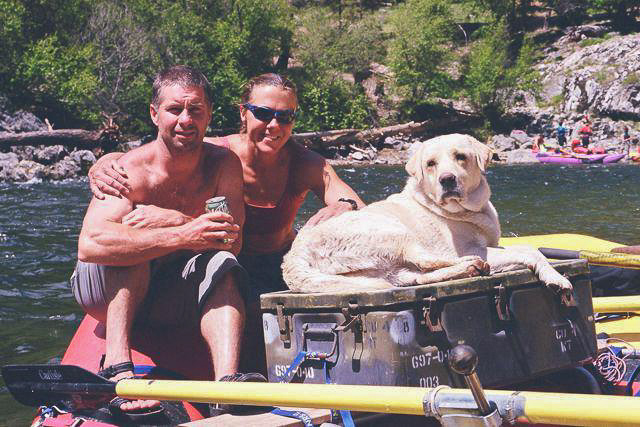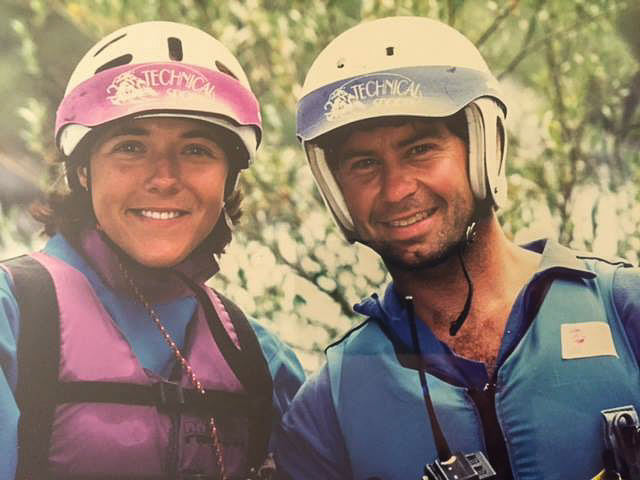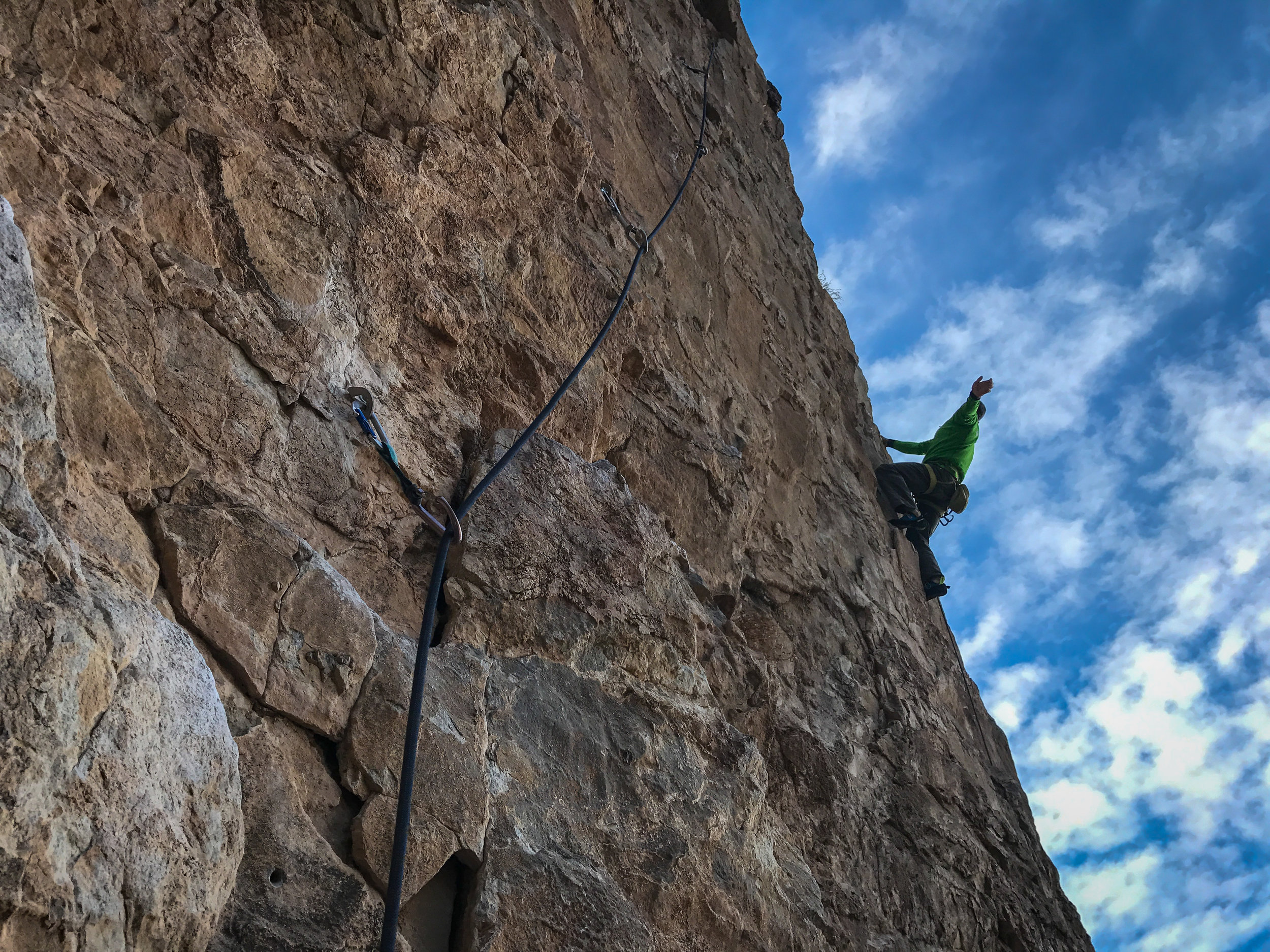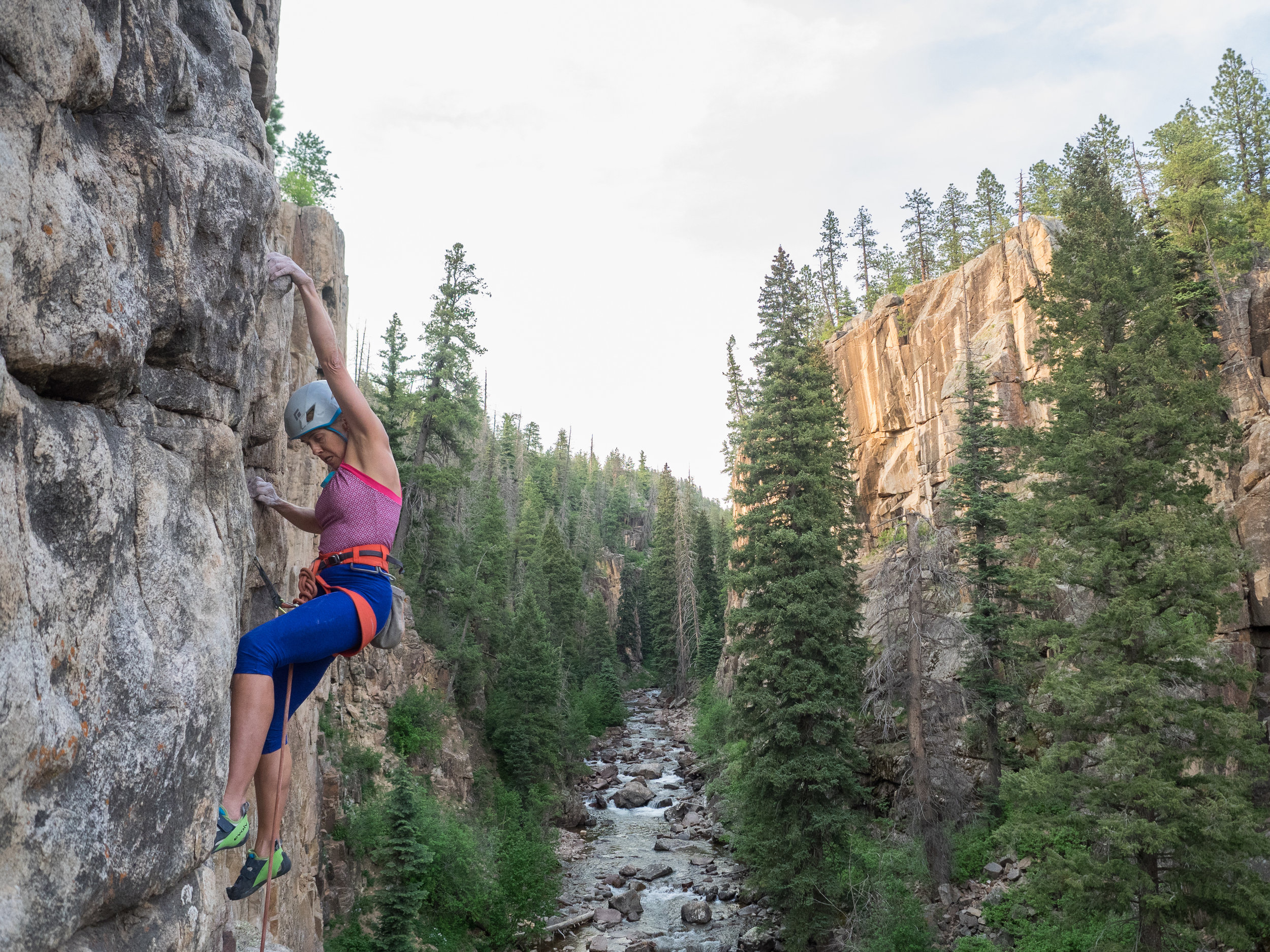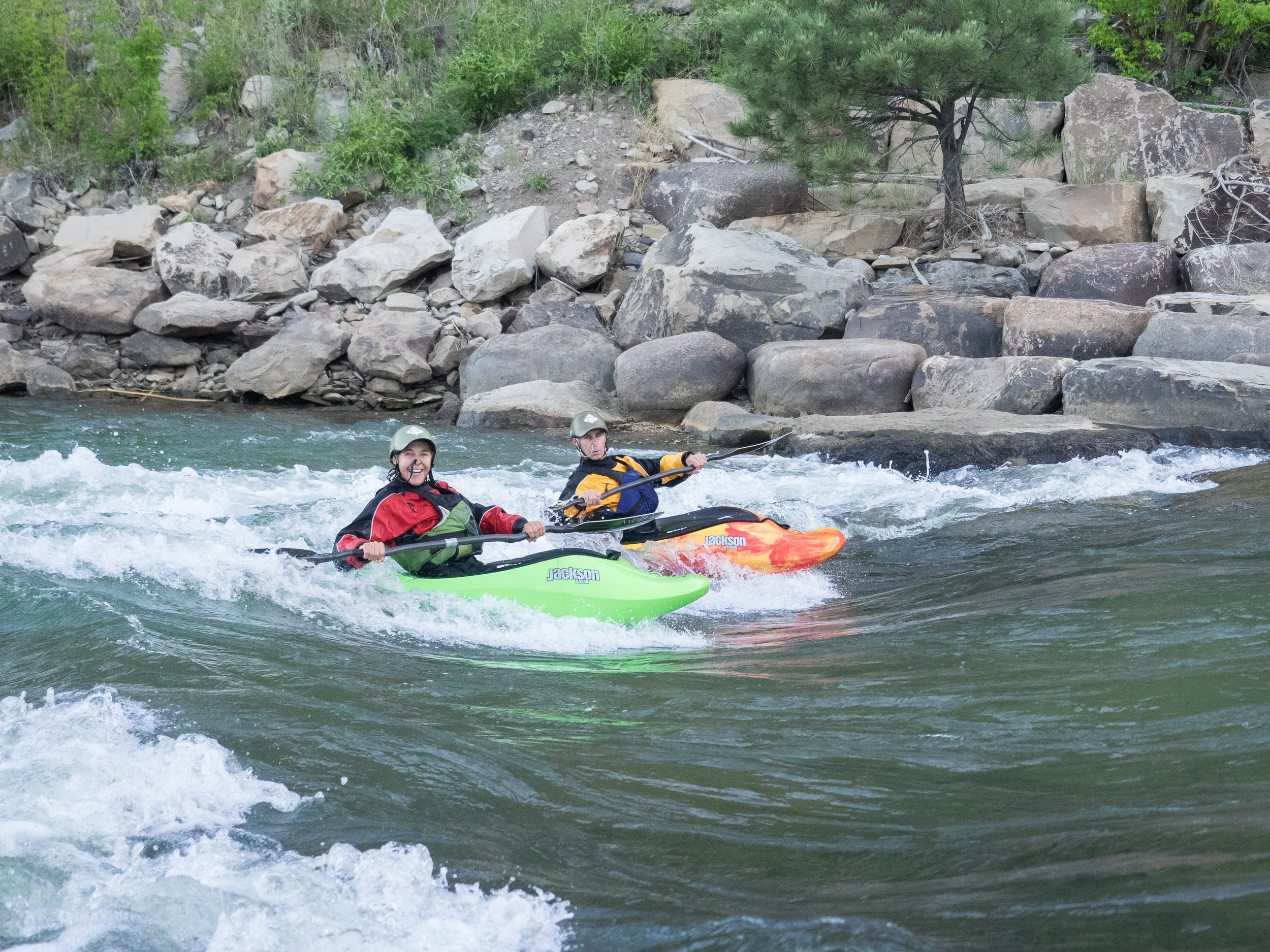Professors of Adventure & Life
In this perfect follow up to the previous post of "This is What We Do," the LC catches up with Earl & Glenna Alderson, two collegiate outdoor educators who have been honing their craft for 31 years. As you will read, they have a lot of great life advice and wisdom to share. Enjoy!
Tell us about yourselves? Give us the who, what, where, etc.
E—We are Earl and Glenna Alderson and we live in Amherst, MA where we both teach at Hampshire College in the Outdoor Programs and Recreational Athletics Department. We have been teaching rock and ice climbing, whitewater kayaking, bicycle maintenance, mountain biking, cross country skiing, life guard training, wilderness first aid and CPR, swimming and various other outdoor skills for the past 31 years.
G—We also lead and facilitate a lot of weekend and extended break trips from whitewater rafting and kayaking to backpacking and cycling. We are exposing students to the outdoors and helping them become confident in pursuing their own adventures.
Thirty-one years?! How did you end up in these positions?
G—We arrived at Hampshire via Siberia. In 1987 we were on a Project RAFT trip (Russians and Americans for Teamwork), which was essentially a program where a bunch of us river guides travelled to Russia to boat with the locals. At that time, the Cold War was just coming to an end and Project RAFT was an attempt by some of our friends to build good will with like-minded Soviets and learn about each other’s countries and cultures through our shared passion of running rivers. It was an exciting time in our lives.
E—During that trip, a friend of ours who happened to be a Hampshire alum and had just landed a job teaching kayaking there, told us that after the trip he was going to bail on the job. He spoke Russian and had studied film during his undergrad years so consequently, when he visited the CNN office in Moscow, he was offered a job as a camera man on the spot. He suggested that we fill his vacancy at the college. He thought we would be a good fit.
G—We ended up arriving at Hampshire at the start of the fall semester for what we believed would be a three-month contract. Needless to say, those three months turned into 31 years or 62 semesters and ultimately, our careers.
Prior to coming to Hampshire, you both seemed to be living the typical vagrant adventurous lifestyle that so many outdoor people do. Why did you become collegiate outdoor educators?
E—The job is a good one. We are actually outside a lot and working with students every day. The administrative part of the job is relatively small in comparison to the contact time we have with students. It is nice to have a job where your time provides a positive contribution to someone else. So many alums through the years come back and talk about how we introduced them to the outdoors and made a difference in their lives. These moments are great validation that what we do is important on a bigger life level. Also, the benefits are great…we work ten-month contracts, but with our vacation time, we really only end up working eight or nine months a year. The rest of the time we are out doing our own things. It is great not having to be locked into a 12 month a year job.
G—In life there are always forks in the road. When this fork came up to head to Hampshire, we chose it…and I am glad we did. It has had its challenges, as all things worth doing do, but we had good advice from others along the way that said:
Never let others dictate your future. You dictate your future. It is up to you to decide what is positive about your situation and have faith that it will get better. You make our own destiny.
These words have helped us a lot and I am really glad we hung on through those challenging times. Just like Earl said, being able to have a positive impact upon a young person’s life is gratifying. Sometimes they will come back and say, “I remember when you said this to me…” In my mind, I’m like “oh no, what did I say.” But then it turns out it was some words of encouragement that helped them feel better about themselves; or helped them to do whatever they were attempting better; or even, gave them the courage to try something new.
What is the power of this profession? What is its value?
E—I think it adds value in the sense that the format and the skills we are teaching are a perfect metaphor for learning the principles that build success in life. For example, when rock climbing, you start on the ground at point A and then it ends 100 feet above at point B. In a relatively short amount of time and space, one can experience a lot of learning. One can expand this experience out to what is required to accomplishing even bigger goals in life. It can be very difficult for this type of thing to happen in a classroom. When you are out physically doing something, it is much easier to connect the dots…easier as an educator to teach broad life skills. I have seen this really happen when out with students for a week or longer. The amount of education that can happen in that week is incredible. It is probably more impactful than what goes on in an entire semester of sitting in a class.
When outside, the world is authentic and real. Not virtual. You can feel the sunshine on your face or the splash of rain on a jacket. You can touch the key hold and use it to pull yourself up to the next. Things are real and one can develop a sense of being able to overcome challenges. There is hope.
--Glenna Alderson
G—This profession has made us both counselors and life coaches in a lot of ways. When I teach kayaking, I always teach them to lift their vision. Or in rock climbing, to plan ahead and think about their next move. All of these outdoor activities encompass a lot of basic living skills from learning how to live in and contribute to a community; to managing risk and taking care of oneself. The outdoors is a great setting to help people succeed in life on a bigger level. For example, the strategies that we employ to successfully scout and run a rapid or to get to the top of a rock climb, can be utilized for success in other aspects of life. When you are outdoors, you are forced to be unplugged from our ever-increasing world of distractions. We are forced to deal with the collective group and become dependent upon each other for support, feedback, safety, etc. You have to engage in relationship building. I believe true relationships are not built through a device. A true connection with others isn’t through a series of 1’s and 0’s. When outside, the world is authentic and real. Not virtual. You can feel the sunshine on your face or the splash of rain on a jacket. You can touch the key hold and use it to pull yourself up to the next. Things are real and you can develop a sense of being able to overcome challenges. There is hope.
E—Along those lines, I think the amazing thing about doing something challenging outside…say walking uphill with a heavy backpack…you may be struggling to make the walk and may not be happy. These moments teach us that not everything is easy. But when the walk is over and the mountain is climbed, you often feel a sense of accomplishment. You realize fulfillment. You are stronger and fitter. Even though there were times of struggle, you made it through and overcame the challenge. This is one of the truths of living—one has to struggle in order to reach the high points that are worth reaching. Life is not easy. Hard work and being uncomfortable are all part of the deal.
Are there other “life truths” that you both teach?
E—I think we try to impart to our students certain values for success such as the importance of being honest…of being very truthful about their abilities. Where they are at and what they need to learn in order to accomplish their goals. We try to teach them about being humble and treating people right…with respect and integrity. These are critical values for living a fulfilled and successful life. Additionally, we talk about the importance of taking care of oneself. If one is not healthy, whether physically or emotionally, everything else can become a struggle. We prioritize our health. Rest is a critical component of that health. I can’t always charge hard all of the time. I have to recover and rest. When I don’t, I tend to get sick and my productivity goes down. It affects everything. Furthermore, we all have to learn how to manage risk. Without it, one can’t get anywhere. But yet, if we continue to stack the cards against ourselves, we are going to crash a lot more. Learning from our mistakes and being willing to fail is important as well. All of these truths are important for everything, whether it be finding a life partner, investing, or learning how to rock climb. It is all the same. When you get good at applying these truths to one thing, one can begin applying them to everything else. Success then will come in your life.
This is one of the truths of living—one has to struggle in order to reach the high points that are worth reaching. Life is not easy. Hard work and being uncomfortable are all part of the deal.
--Earl Alderson
G—The health part that Earl speaks of is so important. It has been one of the great things about this career as it has enabled us to stay mentally and physically healthy for a long time. I always tell students to build their habits for good health when they are young, because life will inevitably get challenging and throw them some unexpected curve balls. If they have the physical and mental stamina, they will be able to deal with whatever comes their way. If you let yourself go and turn 40 or 50 and then decide to get in shape, it can be really difficult to do so. If you love yourself enough to take care of your health, you will have a strong foundation for a very fulfilled life.
What has the profession given you both? How have you each grown as individuals because of this career choice?
E—I feel very lucky to have had such a great career. I am outside everyday teaching what I love to young motivated people. I get to learn from them as much as they do from me. In fact, I have probably learned more from students than I have taught them. In contrast to a lot of other jobs, I probably would not have had the opportunity to learn so much. One of the first things I ask when we get in the van for class or a trip is, “What have you learned today?” It is a great conversation starter for the group and I gain a lot of insight into what they are dealing with on a day to day basis. What is important to them. What they are worried about. What they are passionate about. The students have made me realize how little I actually know and that I don’t have all of the answers. I have learned to accept things for how they are—not feeling the pull to control and change everything. This is a very relaxing place to live life from.
G—I feel pretty happy about how my career and life have unfolded. Every day I try to model the lessons that we share with our students. For example, we hear students all of the time speaking about “changing the world.” I always tell them it starts with one person. Do something nice for yourself and for someone every day. Go clean your room. Get your space organized so you can get your head organized. Take care of yourself first, so you can take care of others. I try to live this advice every day and I feel by doing so, I am changing the world in my own ways.
As a couple you are a rarity in the world in that you are married to each other and also work with each other every single day. How have you made this work?
E—I really can’t imagine it any other way. When it comes down to it, it is super easy for me to work with Glenna. We have different strengths and weakness that complement each other and thus, we can pick up for each other when needed. It is an ideal situation for a partnership both at work and at home.
G—Earl is super understanding and a great listener. We have developed a mutual respect for each other through the years along with an awareness for being tolerant and patient with each other’s flaws. Maintaining a good sense of humor while trying not to take things to serious has been helpful in the longevity of our relationship. The ability to laugh at ourselves is something we both value and rely on when things are difficult. Earl said when we got married to remember things that don’t bend, will break. We have to each be flexible. I think that this has been a core value of our marriage and has helped us to work professionally every day with each other. Lastly, we always have had similar goals and have been on the same page when it comes to helping each other grow as individuals and letting each of us be our unique selves.
You both have one final semester left before you retire, what is next on the horizon for both of you?
E—To be honest, I don’t have a defined idea of what the future is going to look like. We have scouted it in terms of where we are going to live and how we are going to afford to live without a consistent income that our jobs have provided for the past 31 years. But, I don’t know what ultimately it will look like having all of this newly created time. It is going to be fun to have the opportunity to make some decisions about how we utilize that time. We have never had that before.
G—I have chosen not to call it retirement per say, but rather, a reinvention of our current life. We may volunteer for people who need services that they can’t afford, such as giving our time to Habitat for Humanity or kids programs where our skills sets can be fully utilized. It is kind of like graduating from college all over again where we didn’t know what path we would pursue. The difference now, is that we have a little more money than we did then. I am looking forward to the choices ahead and for continuing to surround myself with more good times and extraordinary people. I think our job has prepared us for what lies ahead.
Final thoughts?
G—We are always counselling students and telling them to pace themselves in life. They are going to have a lot of moments of crisis in their lives. What is important is how they deal with these turbulent times…how they respond. We urge them not to give into despair, but yet feel and experience the range of emotions that they will encounter. They have to be able to look beyond the present and keep a perspective that is positive. We don’t want these moments to dictate where their lives will go. Earl and I have been able to do this and as a result, we are living pretty amazing lives together. It continues to be an incredible journey.
E—Glenna and I have always shared the following life rules with students: (1) Saddle Your own Bronc; (2) Don't do Anything Stupid; (3) Remember, Stuff Happens. Life is unpredictable enough so try not to stack the cards in favor of bad things happening. Follow these rules and your life will be pretty damn good. Ours has.
To connect with Earl and Glenna on social media, check them out on Instagram: @whatwoodearldo (Earl) and @glennaalderson (Glenna). Please note that all photos were provided by Earl & Glenna and the LC.

